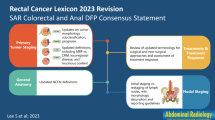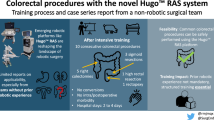Abstract
Introduction
Total mesorectal excision (TME) for rectal cancer can be challenging to perform in the presence of difficult pelvic anatomy. In our previous studies based on open and laparoscopic TME, we found that pelvic MRI-based pelvimetry could well reflect anatomical difficulty of the pelvis and operative time increased in direct proportion to the difficulty. We explored different outcomes of robotic surgery for TME based on classifications of difficult pelvic anatomies to determine whether this method can overcome these challenges.
Methods
We reviewed data from 182 patients who underwent robotic surgery for rectal cancer between January 2008 and August 2010. Patient demographics, pathologic outcomes, pelvimetric results, and operative and postoperative outcomes were assessed. The data were compared between easy, moderate, and difficult groups classified by MRI-based pelvimetry.
Results
Comparing the three groups, there was no difference between the groups in terms of operative and pathologic outcomes, including operation time. High BMI, history of preoperative chemoradiotherapy, and lower tumor levels were significantly associated with longer operation time (p < 0.001, p < 0.001, p = 0.009), but the pelvimetric parameter was not.
Conclusion
There was no difference between the easy, moderate, and difficult groups in terms of surgical outcomes, such as operation time, for robotic rectal surgery. The robot system can provide more comfort during surgery for the surgeon, and may overcome challenges associated with difficult pelvic anatomy.
Similar content being viewed by others
References
Heald RJ, Husband EM, Ryall RD (1982) The mesorectum in rectal cancer surgery—the clue to pelvic recurrence? Br J Surg 69:613–616
Leung KL, Kwok SP, Lam SC, Lee JF, Yiu RY, Ng SS, Lai PB, Lau WY (2004) Laparoscopic resection of rectosigmoid carcinoma: prospective randomised trial. Lancet 363:1187–1192
Jayne DG, Guillou PJ, Thorpe H, Quirke P, Copeland J, Smith AM, Heath RM, Brown JM (2007) Randomized trial of laparoscopic-assisted resection of colorectal carcinoma: 3-year results of the uk mrc clasicc trial group. J Clin Oncol 25:3061–3068
Jayne DG, Thorpe HC, Copeland J, Quirke P, Brown JM, Guillou PJ (2010) Five-year follow-up of the medical research council clasicc trial of laparoscopically assisted versus open surgery for colorectal cancer. Br J Surg 97:1638–1645
Maslekar S, Sharma A, Macdonald A, Gunn J, Monson JR, Hartley JE (2007) Mesorectal grades predict recurrences after curative resection for rectal cancer. Dis Colon Rectum 50:168–175
Kim JG, Heo YJ, Son GM, Lee YS, Lee IK, Suh YJ, Cho HM, Chun CS (2009) Impact of laparoscopic surgery on the long-term outcomes for patients with rectal cancer. ANZ J Surg 79:817–823
Jeyarajah S, Sutton CD, Miller AS, Hemingway D (2007) Factors that influence the adequacy of total mesorectal excision for rectal cancer. Colorectal Dis 9:808–815
Akiyoshi T, Kuroyanagi H, Oya M, Konishi T, Fukuda M, Fujimoto Y, Ueno M, Miyata S, Yamaguchi T (2009) Factors affecting the difficulty of laparoscopic total mesorectal excision with double stapling technique anastomosis for low rectal cancer. Surgery 146:483–489
Boyle KM, Petty D, Chalmers AG, Quirke P, Cairns A, Finan PJ, Sagar PM, Burke D (2005) Mri assessment of the bony pelvis may help predict resectability of rectal cancer. Colorectal Dis 7:232–240
Salerno G, Daniels IR, Brown G, Norman AR, Moran BJ, Heald RJ (2007) Variations in pelvic dimensions do not predict the risk of circumferential resection margin (crm) involvement in rectal cancer. World J Surg 31:1313–1320
Targarona EM, Balague C, Pernas JC, Martinez C, Berindoague R, Gich I, Trias M (2008) Can we predict immediate outcome after laparoscopic rectal surgery? Multivariate analysis of clinical, anatomic, and pathologic features after 3-dimensional reconstruction of the pelvic anatomy. Ann Surg 247:642–649
Kim JY, Kim YW, Kim NK, Hur H, Lee K, Min BS, Cho HJ (2011) Pelvic anatomy as a factor in laparoscopic rectal surgery: a prospective study. Surg Laparosc Endosc Percutan Tech 21:334–339
Baik SH, Kim NK, Lee KY, Sohn SK, Cho CH, Kim MJ, Kim H, Shinn RK (2008) Factors influencing pathologic results after total mesorectal excision for rectal cancer: analysis of consecutive 100 cases. Ann Surg Oncol 15:721–728
Gutt CN, Oniu T, Mehrabi A, Kashfi A, Schemmer P, Buchler MW (2004) Robot-assisted abdominal surgery. Br J Surg 91:1390–1397
Lanfranco AR, Castellanos AE, Desai JP, Meyers WC (2004) Robotic surgery: a current perspective. Ann Surg 239:14–21
Maeso S, Reza M, Mayol JA, Blasco JA, Guerra M, Andradas E, Plana MN (2010) Efficacy of the da vinci surgical system in abdominal surgery compared with that of laparoscopy: a systematic review and meta-analysis. Ann Surg 252:254–262
Baik SH, Kwon HY, Kim JS, Hur H, Sohn SK, Cho CH, Kim H (2009) Robotic versus laparoscopic low anterior resection of rectal cancer: short-term outcome of a prospective comparative study. Ann Surg Oncol 16:1480–1487
Alasari S, Min BS (2012) Robotic colorectal surgery: a systematic review. ISRN Surg 2012:293894
Patel VR, Thaly R, Shah K (2007) Robotic radical prostatectomy: outcomes of 500 cases. BJU Int 99:1109–1112
Veljovich DS, Paley PJ, Drescher CW, Everett EN, Shah C, Peters WA 3rd (2008) Robotic surgery in gynecologic oncology: program initiation and outcomes after the first year with comparison with laparotomy for endometrial cancer staging. Am J Obstet Gynecol 198(679):e671–e679 discussion 679 e679–610
Leff JD, Enriquez LJ (2012) Robotic-assisted cardiac surgery. Int Anesthesiol Clin 50:78–89
Patriti A, Ceccarelli G, Bartoli A, Spaziani A, Biancafarina A, Casciola L (2009) Short- and medium-term outcome of robot-assisted and traditional laparoscopic rectal resection. JSLS 13:176–183
Kwak JM, Kim SH, Kim J, Son DN, Baek SJ, Cho JS (2011) Robotic versus laparoscopic resection of rectal cancer: short-term outcomes of a case-control study. Dis Colon Rectum 54:151–156
Barbash GI, Glied SA (2010) New technology and health care costs—the case of robot-assisted surgery. N Engl J Med 363:701–704
Turchetti G, Palla I, Pierotti F, Cuschieri A (2012) Economic evaluation of da vinci-assisted robotic surgery: a systematic review. Surg Endosc 26:598–606
Luca F, Valvo M, Ghezzi TL, Zuccaro M, Cenciarelli S, Trovato C, Sonzogni A, Biffi R (2013) Impact of robotic surgery on sexual and urinary functions after fully robotic nerve-sparing total mesorectal excision for rectal cancer. Ann Surg 257:672–678
D’Annibale A, Pernazza G, Monsellato I, Pende V, Lucandri G, Mazzocchi P, Alfano G (2013) Total mesorectal excision: a comparison of oncological and functional outcomes between robotic and laparoscopic surgery for rectal cancer. Surg Endosc 27:1887–1895
Leong QM, Son DN, Cho JS, Baek SJ, Kwak JM, Amar AH, Kim SH (2011) Robot-assisted intersphincteric resection for low rectal cancer: technique and short-term outcome for 29 consecutive patients. Surg Endosc 25:2987–2992
Baek SJ, Al-Asari S, Jeong DH, Hur H, Min BS, Baik SH, Kim NK (2013) Robotic versus laparoscopic coloanal anastomosis with or without intersphincteric resection for rectal cancer. Surg Endosc 27:4157–4163
Disclosure
Se Jin Baek, Chang Hee Kim, Min Soo Cho, Sung Uk Bae, Hyuk Hur, Byung Soh Min, Seung Hyuk Baik, Kang Young Lee, Nam Kyu Kim have no actual or potential personal, political, or financial conflicts of interest with regards to this study.
Author information
Authors and Affiliations
Corresponding author
Additional information
This study was presented at the 46th Annual Convention of the Korean Society of Coloproctology. April 5–7, 2013, Gyeongju, Korea.
Rights and permissions
About this article
Cite this article
Baek, S.J., Kim, C.H., Cho, M.S. et al. Robotic surgery for rectal cancer can overcome difficulties associated with pelvic anatomy. Surg Endosc 29, 1419–1424 (2015). https://doi.org/10.1007/s00464-014-3818-x
Received:
Accepted:
Published:
Issue Date:
DOI: https://doi.org/10.1007/s00464-014-3818-x




